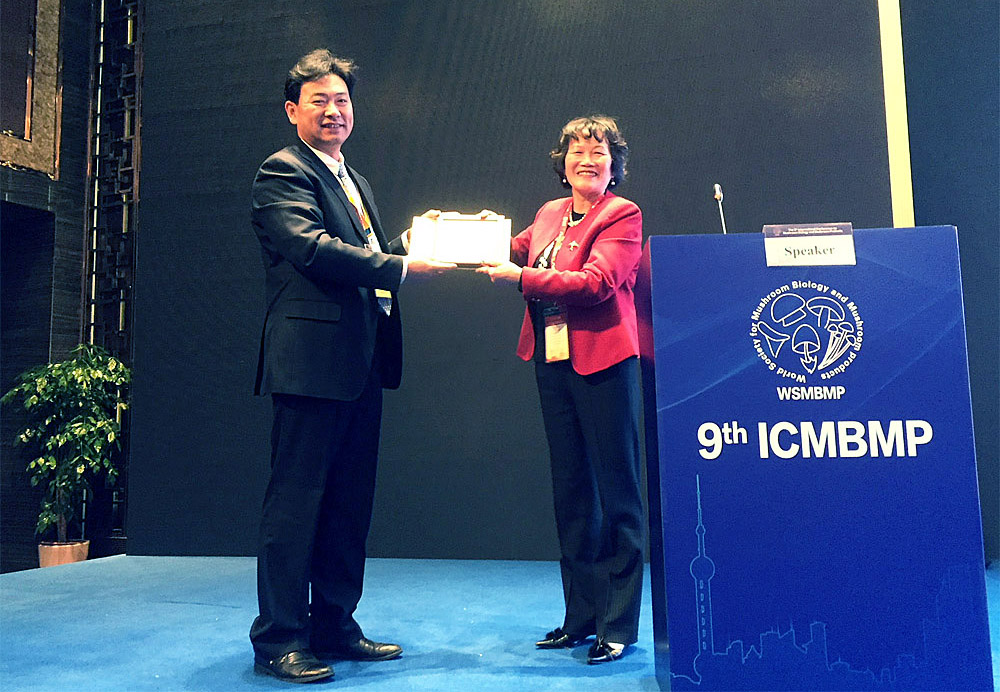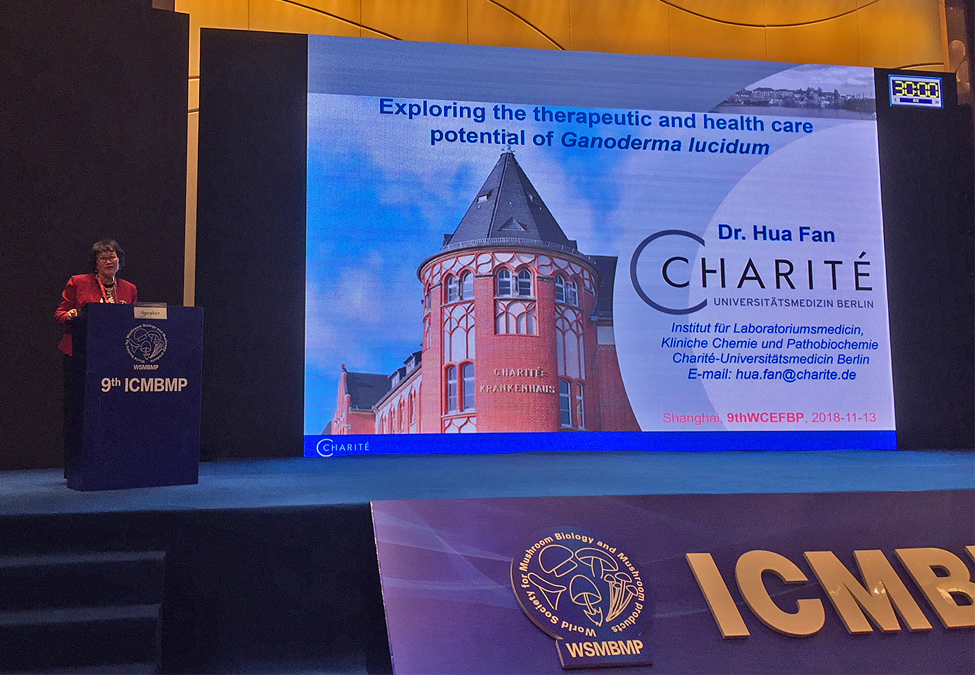In 2018, the 9th International Conference on Mushroom Biology and Mushroom Products was held in Shanghai. Dr. Hua Fan from the Free University of Berlin, Germany, gave a report at the meeting and shared the result of the research conducted jointly by her laboratory and Jinsong Zhang’s Team, Institute of Edible Fungi, Shanghai Academy of Agricultural Sciences. The discussion on how a single Ganoderma lucidum polysaccharide regulates immune and anti-cancer mechanisms and the analysis on how a single Ganoderma lucidum triterpene inhibits the growth of cancer cells provide the medical potential of Ganoderma lucidum and the prospect of new drugs.
Text/ Wu Tingyao
As the host of the meeting, Jinsong Zhang, the director of Institute of Edible Fungi, Shanghai Academy of Agricultural Sciences, presented a certificate to Dr. Hua Fan. The two who had a teacher-student relationship are the important drivers of bringing the traditional Chinese medicine Ganoderma into the European science hall. (Photography/Wu Tingyao)
Hua Fan, who was born in China and planted Ganoderma lucidum in the 1960s and 70s, was one of the few outstanding Chinese scientists who went to Germany to study abroad in the early days. In the early 1990s after the establishment of an immunological and anti-tumor experimental platform at the Free University of Berlin in Germany, she began to cooperate with Institute of Edible Fungi, Shanghai Academy of Agricultural Sciences to explore the bioactive components of Ganoderma lucidum and other medicinal fungi.
The graduate student who went to Germany for exchanges on behalf of Institute of Edible Fungi, Shanghai Academy of Agricultural Sciences was the main person in charge of the 9th International Conference on Mushroom Biology and Mushroom Products, Jinsong Zhang, the director of Institute of Edible Fungi; Hua Fan is the very doctoral supervisor who helped Jinsong Zhang obtain his MD degree from the Free University of Berlin, Germany.
After Jinsong Zhang returned to China, he continued to cooperate with Hua Fan’s laboratory. The polysaccharides and triterpenes in the above report were provided by Jinsong Zhang’s team at Institute of Edible Fungi. The nearly two decades of cooperation between the two parties is of great significance for the introduction of Ganoderma into the European Research hall and the promotion of global research on Ganoderma.
Polysaccharides with different structures have different immune activities.
The team isolated and purified the macromolecular polysaccharide GLIS containing 8-9% protein from the fruiting bodies of Ganoderma lucidum. Cell experiments confirmed that GLIS can activate the entire immune system through cellular immunity (activation of macrophages) and humoral immunity (activation of lymphocytes including B cells).
Actually, injecting GLIS at a dose of 100μg into each mouse pre-vaccinated with S180 sarcoma cells will increase the number of spleen cells (containing lymphocytes) by nearly one-third and inhibit tumor growth (inhibition rate reaches 60~ 70%). This means that Ganoderma lucidum polysaccharide GLIS does have the ability to enhance the immune system’s ability to fight tumors.
Interestingly, another pure polysaccharide, GLPss58, which is isolated from Ganoderma lucidum fruiting body, is sulfated and contains no protein components, not only does not promote immunity like GLIS but also can inhibit the proliferation and activity of macrophages and lymphocytes, reduce the production of inflammatory cytokines, and prevent lymphocytes in the blood from migrating to the inflamed tissues… Its multiple mechanisms reduce the intensity of the immune response. This effect is just suitable for the medical needs of patients with chronic excessive inflammation (such as lupus erythematosus and other autoimmune diseases).
The anti-cancer mechanism of triterpenoids is different from that of polysaccharides.
In addition, Hua Fan’s team also evaluated the anticancer activity of eight single triterpene compounds in the fruiting body of Ganoderma lucidum. The results showed that two of these triterpenes have significant antiproliferative and pro-apoptotic effects on human breast cancer cells, human colorectal cancer cells and malignant melanoma cells.
In further analysis of the mechanisms by which these two triterpenes promote apoptosis of cancer cells, the researchers found that they “directly” force cancer cells to self-destruct through “reducing the membrane potential of mitochondria” and “increasing the oxidative pressure of mitochondria”. This is completely different from the role of Ganoderma lucidum polysaccharide GLIS that “indirectly” inhibits tumors through the immune system.
Polysaccharides or triterpenes can be used singly or in combination.
Hua Fan made us understand through the rigorous German research model that the various active ingredients in Ganoderma lucidum can be “combined” to create the health value of prolonging life or can be “applied separately” to provide specific curative effects for existing diseases.
Is it possible to make the active polysaccharides and active triterpenes in the experiment into clinical drugs in the future? “Then look at the younger generation!” Hua Fan looked expectantly at Jinsong Zhang, who had already established a strong research team.
This article is excerpted from What important Ganoderma topics were discussed in the most important edible mushroom conference in 2018? - The 9th International Conference on Mushroom Biology and Mushroom Products (Part 2).
Dr. Hua Fan from the Free University of Berlin, Germany, gave a presentation on “Exploring the Health Care Potential of Ganoderma” at the 9th International Conference on Mushroom Biology and Mushroom Products. (Photography/Wu Tingyao)
END
About the author/ Ms. Wu Tingyao
Wu Tingyao has been reporting on first-hand Ganoderma lucidum information since 1999. She is the author of Healing with Ganoderma (published in The People’s Medical Publishing House in April 2017).
★ This article is published under the exclusive authorization of the author ★ The above works cannot be reproduced, excerpted or used in other ways without the authorization of the author ★ Violation of the above statement, the author will pursue its related legal responsibilities ★ The original text of this article was written in Chinese by Wu Tingyao and translated into English by Alfred Liu. If there is any discrepancy between the translation (English) and the original (Chinese), the original Chinese shall prevail. If readers have any questions, please contact the original author, Ms. Wu Tingyao.
Post time: Jul-29-2021

